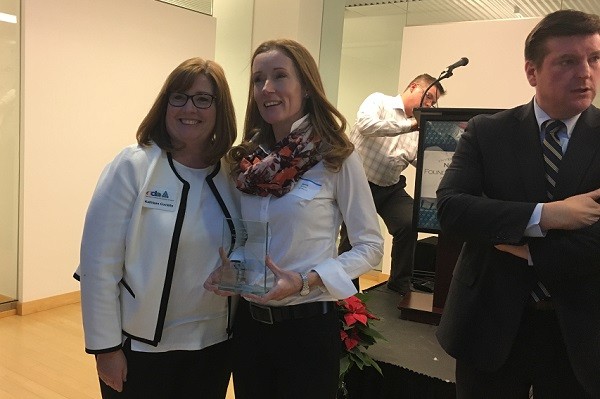LugTrack Wins $50,000 in NJ EDA Founders & Funders “All Stars” Pitch Competition

At the New Jersey Economic Development Authority (EDA) Founders & Funders “All Stars” pitch competition in December, five startups competed for a $50,000 award from the EDA.
LugTrack (Hazlet) was the lucky winner of the award, bestowed after an audience vote.
The pitch competition was part of a larger event, which also included a panel discussion on funding, which we covered here, and investor-founder meetings. The EDA Technology & Life Sciences Division had invited companies that had been to earlier Founders & Funders events over the past five years to return to reconnect with possible funding sources.
Timothy Rollender, senior venture officer in the EDA’s Technology & Life Sciences Division, who coordinated the pitch part of the day, said that from among all the companies that had attended the New Jersey Founders & Funders events in the past, outside advisers to the EDA handpicked 20 to participate in the “All Stars” event.
These 20 companies met with investors in one-on-one meetings during the morning. After these meetings, the investors conferred and came up with the top five companies to pitch to the audience.
The five startups, in the order they presented, were Radius8 (Princeton), LugTrack (Hazlet), VectraCor (Totowa), RevChip (Mount Laurel) and Tenna (Edison).
Radius8
Radius8 cofounder and Vice President of Strategy Brendan Phelan presented this retail tech startup. He said, “We are all about leveraging local data to help the brick-and-mortar store.” Phelan pointed out that most people who go online have problems engaging with the retail store down the block, and that this is a major loss for these businesses.
Radius8 puts ads in context, using local information such as what the weather is like that day, what the social trends are around that location and what inventory is in the store and driving sales. Allowing customers to connect with something nearby gives them a hyper-local retail experience, Phelan said. One example of how this works, he explained, is that online ads can be set to show boots that are in inventory when the local weather is snowy. Radius8 has been in business for 20 months now, and has some major retail customers who are seeing “tremendous ROI [return on investment] by deploying our technology,” Phelan said.
LugTrack
Next up was the winning company, LugTrack, pitched by CFO Denise Brouder. She said, “Our core purpose is to design, develop and commercialize asset-tracking technologies with the intent to track in real time, globally, and with high accuracy.” The company’s products are designed for individual consumers, but can be deployed by enterprises. They are distributed through partnerships, such as the one LugTrack has with the luggage manufacturer TUMI (South Plainfield).
The startup began with an initial patent that’s based on a two-tag system. One part is a packable or embedded device that connects to the user’s smartphone via a customizable app. The device communicates luggage coordinates over a GPS network. For example, TUMI uses the “TUMI Global Locator,” an AT&T-certified device that triangulates the location of a piece of luggage using GSM, satellite and Bluetooth transmission.
VectraCor
Up next was Brad S. Schreck, president and CEO of VectraCor, a company with a unique replacement technology for today’s standard electrocardiogram (EKG) machine. “More people die from heart attacks than cancer in the U.S.,” he told the group. The number-one diagnostic test is the EKG. When a patient has possible heart trouble, a nurse or specialist will hook him or her up to a 12-lead EKG device. “What you may not know as a patient is that more than 50 to 60 percent of the time, the nurses or techs that put on the electrodes put them on wrong.”
In addition, none of the tests they do in the emergency room for possible heart attacks offer real-time feedback, he told the audience. “If there is a device that can offer doctors and nurses the ability to detect heart problems in real time, the better chance they’ll have to save the patient and protect that heart tissue.” VectraCor’s answer is a user-friendly replacement for the EKG device that requires only five electrodes, which are placed in easy-to-find spots. The company also has a patent on a cardio biomarker that is quick and easy and tells the nurses or techs in real time when a patient is having a heart attack.
RevChip
RevChip was presented by Terry Crowley, CEO. The company focuses on payment software, with expertise in Emerging Markets Payments and Apple Pay. Crowley said that while consumers might not realize it, the back office behind the chip card is really a mess and doesn’t always work. Also, merchants have a hard time reaching their customers via search engine optimization (SEO). “We write the best EMP and Apple Pay software for the U.S. market. It runs really well and has a lot of features for the U.S. market at a super-low price,” he said. On top of that, “we allow the merchant and patron to interact.
“So, imagine you had a great meal at a restaurant and the merchant asks, ‘Would you mind doing a review for us?’” The software can send you an SMS receipt while you’re still in the restaurant. The receipt has a link to the restaurant’s Facebook or Yelp page. “This is incredibly important for merchants today,” Crowley said.
RevChip is going after 500,000 to 600,000 retail locations in the U.S. with a million point-of-sale devices. The company is quickly integrating with U.S. payment processors, and counts Cracker Barrel among its customers. “One of the best validations we’ve found is that people are willing to pay us six figures to jump the line,” he said.
Tenna
The final presenter was Austin Conti, cofounder and CEO of Tenna, an asset tracking and management startup. Conti spent his entire career in construction, working on projects globally. He founded Tenna two years ago to provide a better way to manage all the assets on large projects.
“Tenna is an industrial internet-of-things company that solves the problem of asset management holistically,” Conti told the audience. By “holistically,” he meant that “we scale to all assets, regardless of size and value.” The company can handle large construction machinery and hand tools.
Conti noted that there are solutions for some of the asset-management issues, but no single solution that pulls them all together. “What our solution does is link heavy equipment, mid-sized asset tracking and code scanning into a clean system,” in addition to managing the data on these assets.
The fleet-management space has a set price of about $25 per vehicle per month, he said. Heavy equipment costs about $35 per vehicle per month. Code-scanning systems are priced all over the place. “By bringing them all together, we offer a lower-cost solution for the client.” Conti said that Tenna already has 40 clients.

